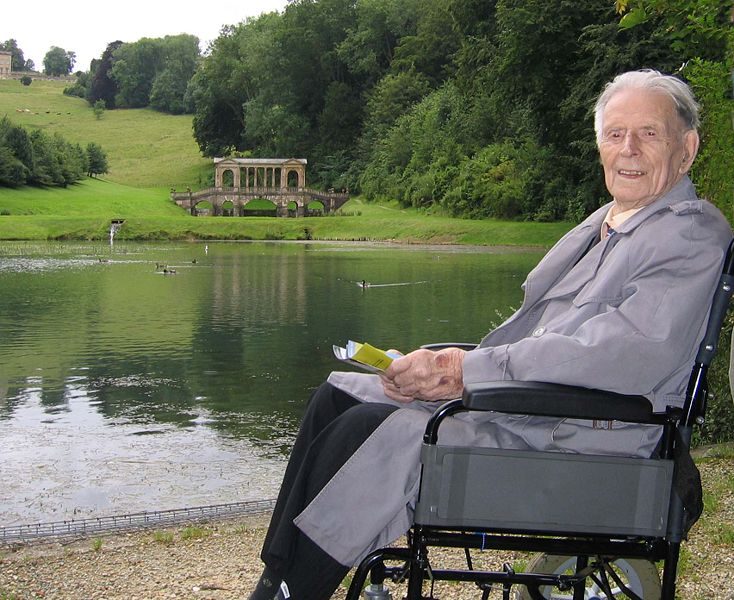Remembering Harry Patch
Sam Dickson, American Renaissance, October 2009

Harry Patch (Credit Image: Jim Ross / Wikipedia)
It is appropriate for us to mark the death on July 25th of Harry Patch. Aged 111, Harry Patch was the last surviving British soldier from our race’s First Peloponnesian War of the last century, that is to say, the First World War. These two fratricidal wars — like the original ones among the Greeks of Antiquity — may have accomplished the complete and possibly fatal wreck of our race and civilization.
Patch survived horrific service in the trenches of Flanders as a machine gunner and suffered severe wounds. For most of his life he was reticent about the war and his service in it, but after his 100th birthday Patch began speaking out against the war and the hatreds it engendered.
He said he was a reluctant soldier, noting that when he first came face to face with a German soldier, he could not help thinking of the commandment, “Thou shalt not kill.” He deliberately shot the German in the shoulder, making him drop his rifle, but the German kept running towards him. He then shot the man twice in the leg. “I had about five seconds to make the decision,” he said. “I brought him down, but I didn’t kill him.”
In July 2007, he was present at the 90th-anniversary commemoration of the beginning of the Battle of Passchendaele, in which he fought. He called the war a “calculated and condoned slaughter of human beings,” and said that “war isn’t worth one life.”
Patch’s funeral was held on August 6, 2009, and was attended by thousands of mourners led by the Duchess of Cornwall. His coffin, draped in a Union Jack, was carried into the 13th century Wells Cathedral 140 miles west of London by soldiers of The Rifles, the successor to Patch’s unit, the Duke of Cornwall’s Light Infantry. Honorary pallbearers included two soldiers each from France, Belgium, and Germany, all in full dress uniform. A German diplomat was one of the scripture readers at the Anglican service.
Patch would have heartily approved of the inclusion of Germans. On the 90th anniversary of the end of the war last November, he attended the remembrance service in London at which his message was, “Remember the Germans.”
It is unfortunate that the service included the ballad “Where Have All The Flowers Gone?” by the one-time Communist, Pete Seeger. A much more appropriate pacifist song would have been Eric Bogle’s 1976 “No Man’s Land,” also known as “The Green Fields of France.” Not only was it written by a Scot rather than an American, it is about the First World War and has more thoughtful lyrics and a better tune.
Given that Mr. Bogle’s ballad mocks Wilsonian and British liberal fantasies about “War to End War,” it is not surprising that “No Man’s Land” is generally unfamiliar to Americans and shunned by American leftists. Such lyrics are blasphemies against the liberal establishment’s Holy Trinity of Lincoln, Wilson, and Roosevelt, and American liberals are notoriously intolerant of those who mock their gods.
Our Weaknesses
Our race has many strengths and many weaknesses. One of those weaknesses is its love of family quarrels and fights. White Europeans love to fight each other. I suspect that it is a sublimated, subconscious form of racism, but whites seem to believe that only a victory over a kindred white nation is worthy of pride. All over Britain today there are monuments commemorating victories over other whites. Almost nowhere does one see a monument to a victory over Sikhs, Hindus, Zulus, etc.
While I am not a pacifist as Patch became, I have to confess that I read history in vain to find any significant war America or any other European nation has fought since the Mexican-American War of 1848 that did any good for our race. Ethnomasochists, however, such as Tom Brokaw with his book, The Greatest Generation, feel otherwise. For them, only wars against whites are good wars.
A similar example is the former President of the Republic of Ireland, Mary Robinson, who was awarded America’s highest civilian honor, the Presidential Medal of Freedom, by Barack Obama in August of this year. In September 1997, both Mary Robinson (in Dublin) and Mexican President Ernesto Zedillo (in Mexico City) marked the 150th anniversary of the end of the Mexican-American War by honoring the San Patricio Brigade (”Saint Patrick’s Brigade”), a unit formed by Irish-American deserters who fought for the Mexicans against their former comrades.
President Robinson spoke of standing shoulder to shoulder in solidarity with Mexicans against a common enemy: the Anglo-Saxons of Great Britain and their Anglo relatives in the United States. Her remarks went almost completely unnoticed by the American media at the time, but many Americans would have agreed with her: treason against fellow whites was preferable to “aggression” against non-whites.
The death of the last British soldier from the First World War is a time for reflection and resolve. We must do our utmost to ensure that our racial family feuds are healed. We must refute and put to rest lies intended to accentuate and prolong such family feuds. We must foster a sense of our common heritage as European whites and remember as our forefathers did in medieval times that there is a shared, overarching race and culture of all Europeans that binds us to each other even as we remain separate and proud members of different white nations. There must never again be a brothers’ war between our kindred nations.















